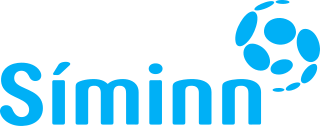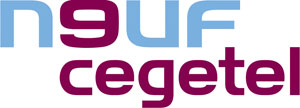Related Research Articles

Communications in Belgium are extensive and advanced. Belgium possesses the infrastructure for both mobile and land-based telecom, as well as having significant television, radio and internet infrastructure. The country code for Belgium is BE.
Telecommunications in Ireland operate in a regulated competitive market that provides customers with a wide array of advanced digital services. This article explores Ireland's telecommunications infrastructure including: fixed and mobile networks, The voice, data and Internet services, cable television, developments in next-generation networks and broadcast networks for radio and television.
Telecommunications in Jamaica include the fixed and mobile telephone networks, radio, television, and the Internet.

The telecommunication infrastructure of Singapore spans the entire city-state. Its development level is high, with close accessibility to the infrastructure from nearly all inhabited parts of the island and for all of the population, with exceptions. Today, the country is considered an international telecommunications hub, an achievement that was driven by Singapore's view that high-quality telecommunications is one of the critical factors that support its economic growth.
Telecommunications in the United Kingdom have evolved from the early days of the telegraph to modern broadband and mobile phone networks with Internet services.
In telecommunications, a customer-premises equipment or customer-provided equipment (CPE) is any terminal and associated equipment located at a subscriber's premises and connected with a carrier's telecommunication circuit at the demarcation point ("demarc"). The demarc is a point established in a building or complex to separate customer equipment from the equipment located in either the distribution infrastructure or central office of the communications service provider.

A telephone company is a kind of electronic communications service provider, more precisely a telecommunications service provider (TSP), that provides telecommunications services such as telephony and data communications access. Many traditional solely telephone companies now function as internet service providers (ISPs), and the distinction between a telephone company and ISP has tended to disappear completely over time, as the current trend for supplier convergence in the industry developes. Additionally, with advances in technology development, other traditional separate industries such as cable television, Voice-over IP (VoIP), and satellite providers offer similar competing features as the telephone companies to both residential and businesses leading to further evolution of corporate identity have taken shape.

Teléfonos de México, S.A.B. de C.V., known as Telmex is a Mexican telecommunications company headquartered in Mexico City that provides telecommunications products and services in Mexico. In 2014, Telmex was the dominant fixed-line phone carrier in Mexico. In addition to traditional fixed-line telephone service, Telmex offers Internet access through their Infinitum brand of Wi-Fi networks, data, hosted services and IT services. Telmex owns 90 percent of the telephone lines in Mexico City and 80 percent of the lines in the country. Telmex is a wholly owned subsidiary of América Móvil.

Comcast Cable Communications, LLC, doing business as Xfinity, is an American telecommunications business segment and division of Comcast Corporation. It is used to market consumer cable television, internet, telephone, and wireless services provided by the company. The brand was first introduced in 2010; prior to that, these services were marketed primarily under the Comcast name.

In the field of telecommunications, the concept of triple play service refers to the provision of three essential services — high-speed broadband Internet access, television, and latency-sensitive telephone services — all delivered over a single broadband connection. This approach emphasizes the convergence of multiple services by a single supplier, aiming to enhance user convenience and streamline service delivery.

Sprint Corporation was an American telecommunications company. Before being acquired by T-Mobile US on April 1, 2020, it was the fourth-largest mobile network operator in the United States, serving 54.3 million customers as of June 30, 2019. The company also offered wireless voice, messaging, and broadband services through its various subsidiaries under the Boost Mobile and Open Mobile brands and wholesale access to its wireless networks to mobile virtual network operators.

Claro Company, known as Claro Mexico or simply Claro, is a Mexican company part of América Móvil, a Mexican telecom group. Claro serves clients in Argentina, Brazil, Chile, Colombia, Costa Rica, the Dominican Republic, Ecuador, El Salvador, Guatemala, Honduras, Nicaragua, Panama, Paraguay, Peru, Puerto Rico and Uruguay. The company's name means "bright," "clear," and also "of course," in both Portuguese and Spanish.

Virgin Media is a telecommunications company from England, founded in 2007, which provides telephone, television and internet services in the United Kingdom. Its headquarters are at Green Park in Reading, England. It is owned by Virgin Media O2, a 50:50 joint venture between Liberty Global and Telefónica.

Síminn hf., previously named Landssíminn and Póstur og Sími, is an Icelandic telecommunications company. It offers communication services for both private and corporate clients, including mobile (2G/3G/4G/5G), landline (VoIP/POTS), Internet (ADSL/VDSL/FTTH) and IPTV services. Síminn also operates multiple TV channels and streaming services. Síminn is listed on the Icelandic stock exchange.
T-Mobile UK was a mobile network operator in the UK. First launched as Mercury One2One on 7 September 1993, the network was originally operated by Mercury Communications. one2one was purchased by Deutsche Telekom in 1999, who rebranded it with their global T-Mobile brand name in 2002.

Neuf Cegetel was a French wireline telecommunications service provider and a mobile virtual network operator (MVNO). It offered various telecommunications services to consumers, enterprises and wholesale customers, ranking second in the country in annual revenues. It was legally established in 2005 following the completion of the merger between Neuf Telecom and Cegetel. As of June 2008, the company became a wholly owned subsidiary of SFR, and the brand disappeared commercially.

The United Kingdom has been involved with the Internet throughout its origins and development. The telecommunications infrastructure in the United Kingdom provides Internet access to homes and businesses mainly through fibre, cable, mobile and fixed wireless networks, with the UK's 140-year-old copper network, maintained by Openreach, set to be withdrawn by December 2025.
Network convergence refers to the provision of telephone, video and data communication services within a single network. In other words, one company provides services for all forms of communication. Network convergence is primarily driven by development of technology and demand. Users are able to access a wider range of services, choose among more service providers. On the other hand, convergence allows service providers to adopt new business models, offer innovative services, and enter new markets.

HKT Limited, also known as Hong Kong Telecom, is one of the largest telecommunications companies in Hong Kong. It has a dominant position in fixed-line, mobile, IDD and broadband services in Hong Kong. HKT Group is a subsidiary of PCCW since 2000, after it was acquired from Cable & Wireless plc.
References
- ↑ CNET News Cable goes for the Quadruple Play
- ↑ Sweney, Mark (6 May 2014). "Virgin Media offers 'quad-play' package". The Guardian.
- ↑ "BT Goes Quad Play and Launches Cheap UK Consumer 4G Mobile Service". ISP Review UK. 25 March 2015.
- ↑ "Quadruple Play". PCCW. Retrieved 21 June 2014.